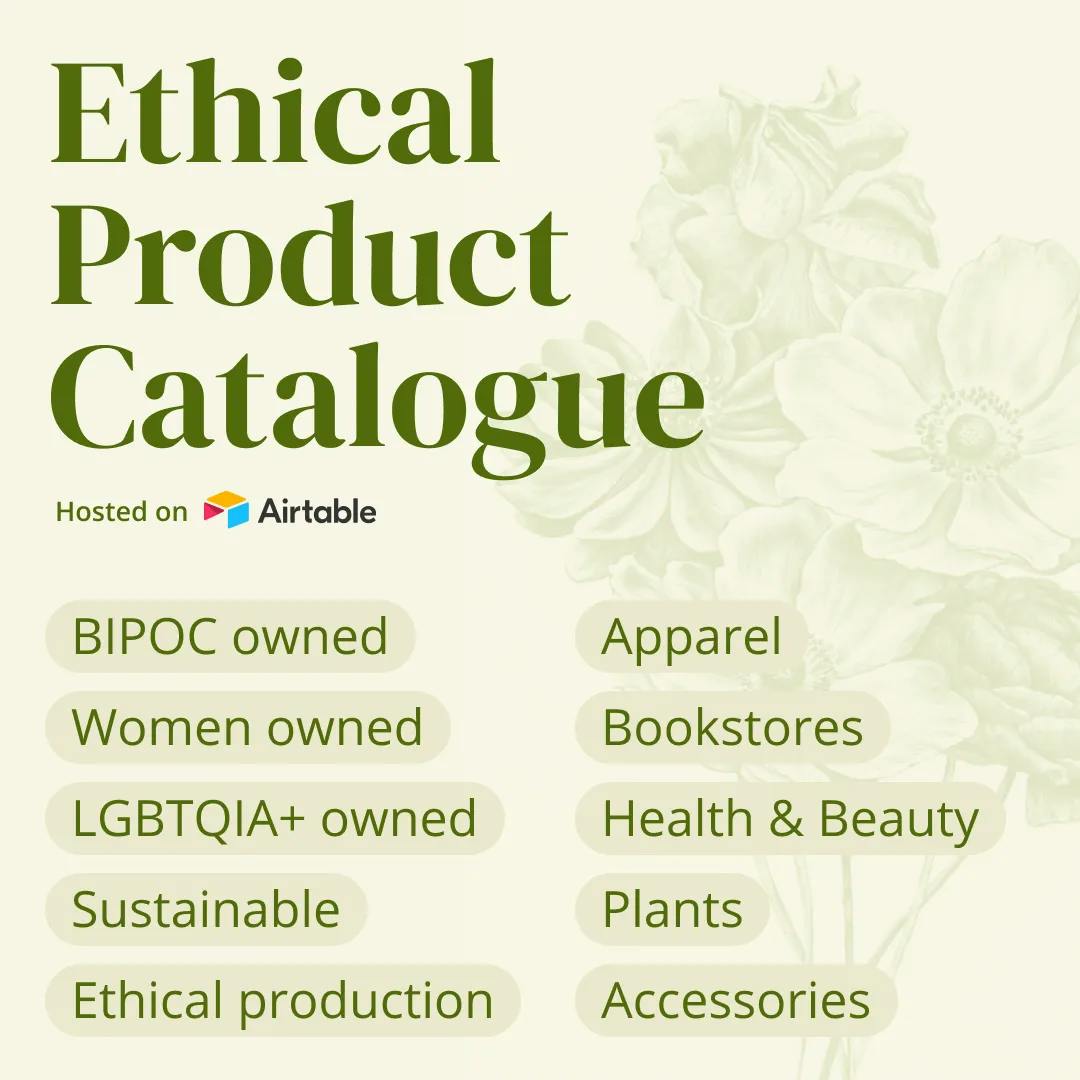
Ethical Product Catalogue
Purchasing is power. Where people choose to spend money affects not only what products are available, but also denotes what consumers find important in their financial decisions. Shopping at small, sustainable, or BIPOC owned and operated companies are all steps people can easily integrate into their everyday lives to support thoughtful companies and keep money out of the pockets of exploitative corporations.
In the summer of 2020, the murder of George Floyd ignited long-standing tensions between the American people, particularly members of the Black community, and police officers engaging in or being complicit in the police brutality that routinely occurs with few to no consequences. This led to a series of protests against unchecked police power and the use of excessive force against civilians and popularized the Black Lives Matter movement. With this reinforced focus on the systemic racism embedded in many aspects of American life, a wealth of resources and information became readily available on social media platforms, and a call to diversify our feeds and reconcile with the racist past and present of the United States became imperative. Part of these efforts to diversify were calls for thoughtful and ethical consumption, as lists of Black-owned businesses populated our feeds and resources to help consumers shop small and shop local increased.
As I scrolled through this abundance of information, I found myself wishing there was a way to organize and consolidate ethical and representative shops in a searchable database. I decided to teach myself Airtable and created the Ethical Product Catalogue.
The database has seven columns:
“Shop Name” is for the name of the store as it is listed on their website.
“Shop Link” contains a direct link to the store’s online catalogue or website.
“Products’’ allows users to filter, search, and categorize entries based on the types of products that the store carries. These options include Apparel, Swimwear, Luxury Fashion, Cleaning Products, Bookstores, Lingerie, Spiritual Wellness, and more. Though I do not believe that clothing has a gender, I decided to add a “Menswear” category to denote stores that offer masculine-oriented clothing, as many of the shops exclusively sold clothing marketed towards women, and I wanted this catalogue to be easily searchable by any user for any type of product.
The fourth column is “Classification,” which allows users to see at a glance who owns the shop. This category started by only marking if a shop was Black-owned or Women-owned. As the Catalogue grew, I also began researching and adding in shops that were Indigenous-owned, POC-owned, and LGBTQIA-owned. On top of ownership, the sustainability of products is another increasingly crucial aspect to consider. Ethical consumption is not only about supporting business with BIPOC ownership, but also extends to understanding how the products we consume affect the environment and who is impacted and/or exploited through the creation of those products. With this in mind, I added shops that specialize in ethical and fair trade production and added classifications like Recycled Materials, Zero Waste Packaging, Carbon Neutral, and Ethical Production. Another important consideration of conscious consumerism is the shops’ impact on its surrounding community and its representation of the population it serves. To highlight successes in diverse model representation and product offerings, I added classifications like Diverse Representation, Community Support, and Plus Size Options. The “Classification’’ tab is a quick catch-all for users to see who owns the shop and what values their company stands for, so users can make informed and conscious decisions when shopping.
The fifth column is “Price,” which gives a general idea of the price point of the shop ranging from $ to $$$$. In general, shops denoted $ tend to have items marked $1–20, $$ is $25–50, $$$ is $50–200, and $$$$ is for shops where the majority of items are listed $200+.
The final viewable column is a “Notes” section, which I use to note if a shop has a notable specialty or only sells a particular item.
The seventh column is kept hidden by default, which is a “Favorites” column where I can check a box to add a heart next to shops I particularly like. Since I did not create the Ethical Product Catalogue to endorse or otherwise sponsor any shops, I keep this feature hidden for my own private use. I originally created this database as a tool for myself, so I could shop more conscientiously. The entire database can be directly copied, and I encourage users to copy it and personalize it with their own Notes and Favorites.
The Ethical Product Catalogue started as a passion project through which I could funnel my desire to promote diverse businesses and improve my own shopping habits, so it is my pleasure to share this resource with as many people as possible. At the time of writing this, the Catalogue has over 400 entries, each one individually researched and uploaded by me, and it continues to grow daily. My hope is that this database can make ethical shopping easy, fun, and accessible!
If you have suggestions for stores or resources to add to the Ethical Product Catalogue, please don’t hesitate to reach out to me with the store name and link at caseeger210@gmail.com. Thank you so much for taking the time to share resources and help grow the Ethical Product Catalogue!
